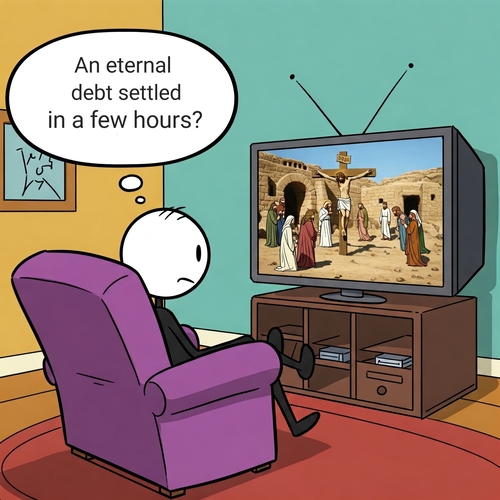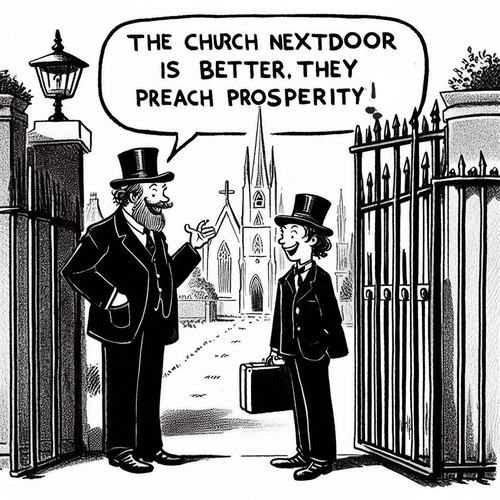Sin’s Eternal Punishment: Did Jesus Settle the Debt in 3 Days?
One question often troubles both believers and sceptics alike: If sin deserves eternal punishment, how could Jesus’ suffering for just three days possibly pay our infinite debt? Shouldn’t He still be suffering if the punishment for sin is truly eternal?
This apparent contradiction has led many to question the sufficiency of Christ’s atonement. However, when we examine Scripture and Reformed theology carefully, we discover this objection misunderstands both the nature of Christ and the nature of His sacrifice.
UNDERSTANDING SIN’S ETERNAL PUNISHMENT
To grasp why Jesus’ finite suffering satisfies an eternal debt, we must first understand why sin deserves eternal punishment.
Sin against an infinite God is an infinite offense. When finite creatures rebel against their infinite Creator, they commit a crime of immeasurable gravity. Our obligation to God is limitless; therefore, our sin against Him carries limitless consequences.
For human beings, eternal punishment reflects both the severity of sin and our ongoing rebellion. Unable to fully bear God’s wrath in a moment, our punishment extends endlessly through time. This isn’t because God hasn’t punished enough, but because we, as finite beings, cannot endure the full weight of divine judgement at once.
THE UNIQUENESS OF CHRIST’S PERSON
The key to resolving our dilemma lies in understanding who Jesus is. Unlike any of us, Christ is the God-man—fully divine and fully human in one person.
This dual nature means Jesus’ suffering holds infinite value. John Calvin explained it this way: “When we say that salvation was manifested to the world in Christ, we do not mean that there was no other remedy, but that there was no other way by which God could deliver us.”
As God incarnate, Christ’s sufferings have an infinite quality that our sufferings do not. While we can only experience punishment in extended duration, He could bear the full intensity of divine wrath concentrated in a finite period.
THE COMPLETENESS OF CHRIST’S WORK
When Jesus declared “It is finished” (John 19:30), He used the Greek word tetelestai—a term often written across business receipts to indicate “paid in full.” This was no claim of mere completion; it was a declaration of perfect satisfaction.
On the cross, Jesus didn’t merely sample God’s wrath—He exhausted it. The Cup of divine judgement was not sipped but drained completely. As Isaiah prophesied, “the LORD has laid on him the iniquity of us all” (Isaiah 53:6).
What makes this possible is the doctrine of imputation. Our sin was credited to Christ’s account, and His righteousness is credited to ours. This divine exchange means Jesus could bear the full penalty our sins deserved.
BIBLICAL EVIDENCE FOR THE SUFFICIENCY OF CHRIST’S ATONEMENT
Scripture repeatedly affirms Christ’s sacrifice was completed once for all time:
- “He entered once for all into the holy places… securing an eternal redemption” (Hebrews 9:12)
- “We have been sanctified through the offering of the body of Jesus Christ once for all” (Hebrews 10:10)
- “Christ died to sin once for all” (Romans 6:10)
- “Christ suffered once for sins, the righteous for the unrighteous” (1 Peter 3:18)
The biblical testimony is clear: Christ’s sacrifice was singular, definitive, and completely effective. There is no suggestion that His suffering continues or was somehow inadequate.
SIN’S ETERNAL PUNISHMENT: COMMON OBJECTIONS ANSWERED
Some argue the value of punishment lies in its duration. This misunderstands both divine justice and the nature of Christ’s person.
Justice demands the penalty match the crime—not necessarily in form, but in equivalence. A fine of one million dollars and imprisonment for one year might seem incomparable, yet either could serve as just punishment for the same offense depending on circumstances.
Similarly, Christ’s divine nature means His temporary suffering perfectly equals the eternal suffering deserved by those He redeems. As Charles Hodge expressed it: “The satisfaction of Christ was perfectly adequate to accomplish all the ends of punishment, and therefore rendered the punishment of the sinner unnecessary and unjust.”
THE REFORMED UNDERSTANDING
Reformed theology has always emphasised penal substitution—Christ stood in our place, bearing the punishment we deserved. As our covenant representative, His death counts as if we ourselves had died and satisfied divine justice.
This understanding connects to other Reformed doctrines such as unconditional election and particular redemption. Christ’s sacrifice wasn’t potentially effective for everyone if they choose to accept it; it was actually effective for His elect. He paid a specific debt for specific people—and that debt is settled completely.
SIN’S ETERNAL PUNISHMENT AND CHRIST’S COMPLETED WORK
The wonder of the gospel is that Jesus’ three days of suffering fully satisfied the eternal debt of sin. We need not fear that divine justice remains unsatisfied or that Christ’s work was somehow incomplete.
As the hymn writer Augustus Toplady beautifully expressed: “Payment God cannot twice demand/ First at my bleeding Surety’s hand / And then again at mine.”
The debt is paid. The work is done. The divine transaction is complete.
And because Christ rose again and “death no longer has dominion over him” (Romans 6:9), we have living proof His sacrifice was accepted by the Father as full payment for our sins.
Christ doesn’t continue suffering because He doesn’t need to. His perfect sacrifice, offered by an infinite person for His beloved people, has settled the debt forever. This is the heart of Reformed theology—and the source of our eternal confidence.
Let’s rest today in this truth: If we’re in Christ, our account with God reads “Paid in Full.”
SIN’S ETERNAL PUNISHMENT: RECOMMENDED RESOURCES:
- The Cross of Christ by John Stott
- Pierced for Our Transgressions by Steve Jeffery, Mike Ovey, and Andrew Sach
- The Death of Death in the Death of Christ by John Owen
SIN’S ETERNAL PUNISHMENT: RELATED FAQs
Did Jesus experience the same type of suffering that occurs in hell? Jesus experienced the essence of hell—divine abandonment and the full wrath of God—but not its exact form. As RC Sproul noted, “On the cross, Jesus was experiencing hell itself, not symbolically but literally,” though His suffering took a concentrated rather than extended form due to His divine nature.
- If Jesus paid for sins “once for all,” why did He need to suffer for three days rather than just a moment? The three-day period wasn’t about accumulating sufficient suffering but demonstrating the reality of Christ’s death and resurrection. John Piper explains, “The duration was not about quantity of suffering but the fulfillment of God’s redemptive plan, which included not just death but resurrection—proof the payment was accepted.”
- Does the Reformed view mean Jesus only died for the elect? Yes, Reformed theology teaches particular redemption—that Christ died specifically for His chosen people, securing their salvation with absolute certainty. JI Packer described it powerfully: “The death of Christ actually saves the elect from their sins because it was a death for the elect specifically, securing the covenanted gifts which the Father had decreed for them.”
How can Christ’s sacrifice be sufficient for all but efficient only for the elect? Christ’s sacrifice has infinite value because of His divine nature, making it objectively sufficient for all humanity, yet it was specifically intended for and applied to the elect. As Francis Turretin wrote, “The satisfaction of Christ was, in itself, sufficient for all men—but efficient only for the elect, according to the will of God and intention of Christ.”
- What about verses that say Christ died for “the world” or “all people”? These universal terms in Scripture often indicate Christ died for people from all categories—all nations, classes, and types—rather than every individual. John Owen argued that “all” and “world” in redemptive contexts typically refer to “all of God’s chosen people throughout the world,” demonstrating God’s impartiality across human divisions.
- Could God have chosen another way to save humanity? While God is sovereign and could have chosen differently, Reformed theology emphasizes that the cross represents perfect divine wisdom—the only way that satisfies both God’s justice and mercy. Jonathan Edwards maintained that “God’s requiring satisfaction for sin was not from any defect of power, but from the perfection of His nature,” showing why no alternative could achieve the same harmony of divine attributes.
Does Christ continue to intercede for us if His work is finished? Christ’s atoning work is complete, but He continues His priestly ministry of intercession on our behalf. Charles Spurgeon explained, “Christ’s blooad-shedding is finished; His dying for sin is completed; but His representation of our interests before the throne continues perpetually,” ensuring ongoing application of His perfect sacrifice.
SIN’S ETERNAL PUNISHMENT: OUR RELATED POSTS
Editor's Pick

The Throne-Room Vision: Who Did Isaiah See?
The scene is unforgettable: Isaiah stands in the temple, and suddenly the veil between heaven and earth tears open. He [...]

The Angel of the Lord: Can We Be Certain It Was Christ All Along?
Throughout the Old Testament, a mysterious figure appears: the Angel of the LORD. He speaks as God, bears God’s name, [...]
SUPPORT US:
Feel the Holy Spirit's gentle nudge to partner with us?
Donate Online:
Account Name: TRUTHS TO DIE FOR FOUNDATION
Account Number: 10243565459
Bank IFSC: IDFB0043391
Bank Name: IDFC FIRST BANK






